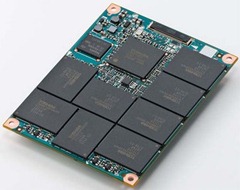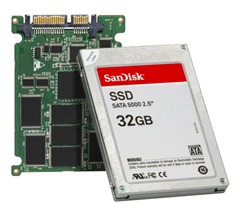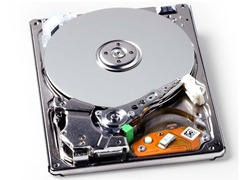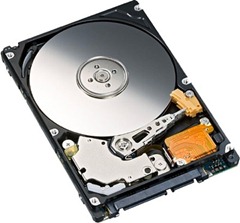Solid State Drives are Technology of the Day.
New Technology = Expensive
Solid State drives with 64 GB capacity cost almost $180+
HDDs record data by magnetizing ferromagnetic material directionally, to represent either a 0 or a 1 binary digit. While SSDs use non-volatile flash memory




Reliability of the drives
HDD drives use mechanical parts are there lifespan is limited. While SSD using flash memory can sustain almost 100,000 write cycles per write cell.
Read/Write Speeds
The typical access time for a Flash based SSD is about 35 – 100 micro-seconds
Whereas that of a rotating disk is around 5,000 – 10,000 micro-seconds. That makes a Flash-based SSD approximately 100 times faster than a rotating disk.
HDD data transfer rate at the rate of 80 megabytes per second typically.
SSD data transfer rate at the rate of 170 megabytes per second typically.
Although SSD are slow when to compared to small file writes, they have a constant read and write rate.
At Cebit 2009, OCZ demonstrated a 1 TB flash SSD using a PCI Express x8 interface. It achieves a maximum write speed of 654MB/s and maximum read speed of 712MB/s
Audible noise
HDD have audible clicks and crunching sounds. While SDD drives are often quieter because they have no mechanical parts
Size
Flash-based SSDs are manufactured in standard 2.5″ and 3.5″ form factors. 2.5″ SSDs are normally used in laptops or notebooks while the 3.5″ form factors are used in desktops
Vibration
SSDs are naturally more rugged than HDDs. SSD drive can sustain up to 1,500 Gs of shock before sustaining damage or a drop in performance. While HDD drives can withstand up to 350 Gs while operating and 800 Gs when turned off.
Reliability
SSD have the ability to deliver unnerving performance in extreme conditions making it to play a vital role in military operations,defense, aerospace or aviation applications. Military applications require, in most cases, an operating temperature range of -60°C to +95°C. Shock, vibration, and temperature ratings of HDDs cannot comply with military standards, only SSDs can.
Power Play
SSDs have low power consumption over HDDs
Heat Dissipation
Along with the lower power consumption, there is also much lesser heat dissipation for systems using Flash-based SSDs as their data storage solution. This is due to the absence of heat generated from the rotating/movable media. This certainly proves to be the one of the main advantages of Flash-based SSDs relative to that of a traditional HDD. With less heat dissipation, it serves as the ideal data storage solution for mobile systems such as PDAs, notebooks, etc.
Cost Considerations
The cost of SSD are typically $3 per gigabyte, while traditional hard drives cost about 20 to 30 cents per gigabyte
Conclusion
If you can go for an SSD because your pocket makes it easy. Then you should definitely chose for SSD otherwise wait at least 3 to 5 years when there prices drop.
SSD Vs HDD Comparison
by
Comments
7 responses to “SSD Vs HDD Comparison”
Do the solid state drive do instant on booting up the computer? i have 2 hard drives in a raid 0 will the solid state drive be faster for boot up time
Yes,of course see this
http://www.youtube.com/watch?v=rjCmLJtITK4
Was this written in another language and then translated? Did anyone read or edit it prior to publication?
“HDD drives use mechanical parts are there lifespan is limited. “While SSD using flash memory can sustain almost 100,000 write cycles per write cell.”
Besides the poor english, isn’t the 100,000 write cycles equally a limitation?
You offer no advice on how to compare the lifespan limits with write cycle limits.
Your final paragraph needs editing also.
“Conclusion
If you can go for an SSD because your pocket makes it easy. Then you should definitely chose for SSD otherwise wait at least 3 to 5 years when there prices drop.”
Why do bloggers insist on NOT exposing the date for their posts when they’re going to put date/time data (as in the quote above) in their posts? If it weren’t for the comments posted here, I wouldn’t know if this article was written 3 years ago or yesterday.
Thnx i was looking for this information
hi there old ssd were limited too 100,000 cycles per block new ssd dont have limited block cycle you can eceed 1.4 petabytes or more on new ssd hard drives are telling you lies that ssd are limited too 100,000 cycles
What? No mention of degradation over write repetitions for SSDs?
No write speed comparison?
Deceptive and inconclusive.
I’ll have to look for an article that will explain this properly now.